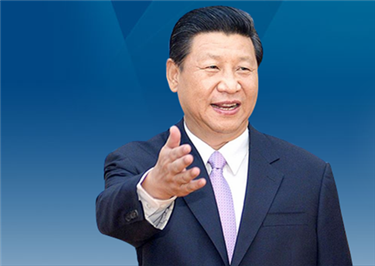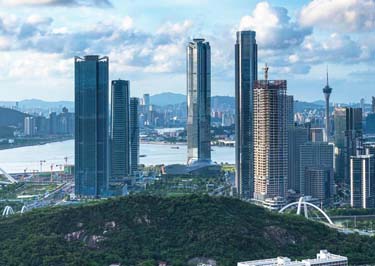Resolution of the Central Committee of the Communist Party of China on the Major Achievements and Historical Experience of the Party over the Past Century
8. Promoting social advancement
Since the launch of reform and opening up, the Chinese people have witnessed notable improvements in their living standards and in social governance. Meanwhile, in pace with the changing times and social progress, they have developed an increasingly strong desire for a better life and growing demands for democracy, rule of law, fairness, justice, security, and a better environment.
The Central Committee has stressed that satisfying the people's aspirations for a better life is the goal of all the Party's work; that improving the people's wellbeing is an essential requirement in the Party's commitment to serving the public good and governing for the people; that ensuring a better life for the people is the immutable aim of all the Party's endeavors; and that addressing inadequacies in support for people's basic needs and solving the most pressing difficulties of great concern to the people are urgent tasks in advancing social development.
We must, therefore, strengthen social development by laying stress on ensuring and improving people's wellbeing. We must do everything within our capacity and keep working year by year to tackle one issue after another. In particular, we need to make steady progress in ensuring people's access to childcare, education, employment, medical services, elderly care, housing, and social assistance, and we need to strengthen social governance by developing new practices, so that the people will have a more robust, solid, and sustainable sense of fulfillment, happiness, and security.
In the push to moderate prosperity, the Party was deeply aware that raising the living standards of rural residents was critical. Only by securing a victory in the fight against poverty, which is a fundamental task in building a moderately prosperous society in all respects, could China fulfill its First Centenary Goal. Therefore, extraordinary moves were needed to advance the fight against poverty with greater resolve, more targeted approaches, and more powerful measures.
To this end, the Party introduced a strategy of targeted poverty alleviation and set the objectives of guaranteeing food and clothing needs and ensuring access to compulsory education, basic medical services, and safe housing for the impoverished rural population. It applied a responsibility system whereby heads of Party and government bodies pledged themselves to win the fight against poverty in their localities. The whole Party, the entire nation, and all sectors of society were mobilized in the most extensive and aggressive anti-poverty campaign in human history. As they tackled the most daunting challenges and surmounted the most difficult obstacles, the Chinese people forged a great spirit in the fight against poverty.
Since the 18th National Congress, 832 counties, 128,000 villages, and nearly 100 million rural residents that fell below the current poverty line have been lifted out of poverty. China has thus achieved the poverty reduction target laid out in the UN 2030 Agenda for Sustainable Development ten years ahead of schedule, brought about a historic resolution to the problem of absolute poverty in China, and created a miracle in the human history of poverty reduction.
In 2020, facing the sudden outbreak of the novel coronavirus epidemic, the Central Committee responded calmly and decisively, and set out the general requirements to stay confident, stand united, and adopt a science-based approach and targeted measures. With the commitment to putting the people and human life above all else, the Central Committee led the whole nation in an all-out people's war to curb the spread of the virus. It made well-conceived plans for the battles to defend Hubei Province and its capital city Wuhan and pooled nationwide resources to save lives on an unprecedented scale. It worked to ensure constant vigilance against imported cases and domestic resurgences, coordinated the Covid-19 response with economic and social development, and thus protected the health and safety of the people to the greatest extent possible. These efforts enabled China to lead the world in getting the epidemic under control, restarting work and production, and resuming economic and social development. With this major strategic success through our response, we have forged a great spirit in the fight against Covid-19.
To ensure and improve people's wellbeing, the Party has introduced a range of major measures concerning income distribution, employment, education, social security, healthcare, and housing support in accordance with the principles of meeting basic needs, prioritizing key areas, improving institutions, and guiding expectations. Efforts have been focused on providing inclusive public services, meeting essential needs, and ensuring basic living standards, with progress made in providing equal access to basic public services.
We have worked to develop an income distribution system that emphasizes efficiency while promoting fairness. By adjusting excessive income, prohibiting illicit income, increasing the income of low-income groups, and steadily expanding the size of the middle-income group, we have promoted the formation of an olive-shaped pattern of distribution and ensured that personal incomes generally grow in step with economic growth and that rural income grows faster than urban income. We have implemented an employment-first policy and worked to achieve fuller and higher-quality employment.
We have worked to implement the Party's education policy in full and given priority to educational development. We have made it clear that the fundamental task of education is to foster virtue and nurture a new generation of capable young people with the moral grounding, intellectual ability, physical vigor, aesthetic sensibility, and work skills needed to join and carry on the socialist cause. We have bolstered reform and innovation in education and teaching in order to promote fair and higher-quality education. We have worked to promote balanced development and urban-rural integration in compulsory education, make education and instruction in the standard spoken and written Chinese language available across the country, and keep off-campus tutoring well-regulated. We have taken active steps to develop vocational education and worked to bring out the full potential of higher education. Through these efforts, we have strived to develop a strong education system that the people are satisfied with.
China has established the world's largest social security system, with 1.02 billion people covered by basic old-age insurance and 1.36 billion people by basic medical insurance.
We have advanced the Healthy China Initiative across the board. Following the principle of putting prevention first, we have deepened reform of the medical and healthcare systems and shifted the focus of medical and health care down to the community level, channeling resources accordingly. We have taken prompt action to improve major epidemic prevention and control systems and mechanisms as well as the national public health emergency management system. We have worked to promote the preservation, innovation, and development of traditional Chinese medicine and strengthened the public health service system covering both urban and rural areas.
As we have stepped up our efforts to build China into a sporting nation, we have launched extensive public fitness activities and vigorously promoted China's sporting spirit.
We have intensified research on our population development strategy. In response to population aging, we have accelerated the development of elderly care services, and we have adjusted and improved the family planning policy so as to promote balanced development of the population over the long term.
We have given greater weight to strengthening family ties, values, and traditions, and worked to better protect the rights and interests of women and children. We have acted more quickly to develop programs for people with disabilities.
Adhering to the principle that housing is for living in and not for speculation, we have moved faster to build a housing system with multiple types of suppliers and support channels that encourages both renting and buying, and increased investment in the construction of government-subsidized housing. All this has led to significant improvements in urban and rural housing conditions.
To ensure the lasting stability of the country and a happy and comfortable life for the people, the Party has strived to advance the Peaceful China Initiative to a higher level and improve the social governance system. It has enhanced the Party organization-led urban and rural community governance system featuring a combination of self-governance, the rule of law, and the rule of virtue, and it has shifted the focus of social governance down to the community level. This has helped develop a social governance system based on collaboration, participation, and benefit sharing and fostered communities of social governance in which everyone fulfills their responsibilities and shares in the benefits.
We have bolstered disaster prevention, mitigation, and relief efforts, improved workplace safety, and strengthened our national emergency management system and capacity.
We have carried on and developed the Fengqiao model in promoting social harmony in the new era. By continuing to address issues at the source through systematic, law-based, and holistic approaches, and by refining the system for handling public complaints, we have improved integrated mechanisms for preventing, mediating, and defusing social problems. We have adopted a full range of measures to maintain law and order, launching campaigns to combat and root out organized crime, cracking down on Party officials who condoned, covered up, or even provided protection for organized crime, and taking steps to prevent and combat violence and terrorism, new types of cybercrime, and transnational crime.
Since the Party's 18th National Congress, we have promoted social advancement across the board. The people's lives have improved in all areas, public participation in social governance is growing, and social governance is becoming smarter, more law-based, and more specialized. We have continued to develop a sound atmosphere in which people are able to live and work in peace and contentment and social stability and order prevail. As a result, China's miracle of long-term social stability has continued.







